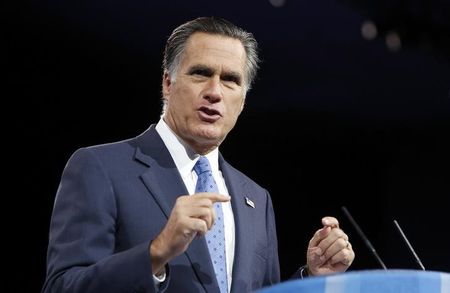By Steve Holland
WASHINGTON (Reuters) - Mitt Romney, day in and day out, hears it wherever he goes, whether at campaign events for Republican congressional candidates, restaurants, or private dinners, the message is the same - run for president in 2016.
Romney associates say he is flattered by the attention and believes he would have done a better job if he had defeated the Democratic incumbent President Barack Obama in 2012 when he was the Republican nominee.
But Romney typically insists in public that he is not going to run for a third time after losses in 2008 and 2012.
"I'm not running and I'm not planning on running. I've got nothing to add to that story," he told supporters during a stop this week at Atlanta's Varsity restaurant, where he had a hot dog and onion rings, according to the Marietta Daily Journal.
Still, friends and former aides say, he could seek the nomination if a series of events plays out in his favor, chiefly that no single powerhouse emerges from what is expected to be a crowded field of Republicans vying for the party's nod.
Some Republicans who know Romney well are advising him to tread carefully.
"I'm sure there are people who invested a lot in him last time who are urging him to consider it," said Republican Senator John McCain from Arizona, the party's 2008 nominee.
"I think it's fine if he considers it. But at the same time I think Mitt would have to feel that he has a real strong shot at winning because it is such a very, very tough ordeal not only on the candidate but also on the family," McCain told Reuters on Monday.
"One thing that he's got going for him is everybody in the Republican Party likes Mitt Romney. They may not think he ran the best campaign, but he's such a very decent human being, he certainly checks the box for likeability amongst the Republican Party," McCain added.
Karl Rove, the Republican strategist who was the architect of George W. Bush's 2000 and 2004 campaigns, was similarly cautious.
"If he were to do this again, it would be the equivalent of running three back-to-back-to-back marathons," Rove told Reuters on Monday. "It would require basically a year's commitment to the primary and another year commitment to the general election. That's a hard thing to ask of anybody in politics."
Romney has stoked some of the 2016 speculation himself. He has gone from absolutely ruling it out in the months after he lost the 2012 election to equivocating in more recent public comments. "We'll see what happens," he told the New York Times Magazine.
He has clearly been energized by the attention he has drawn in campaigning for congressional candidates ahead of the Nov. 4 elections, most recently on a swing through Virginia, Georgia, Oklahoma, Michigan, Kentucky and Louisiana.
Polls are sounding an encouraging note. A USA Today/Suffolk University poll in August said 35 percent of Republican voters in Iowa, which Romney narrowly lost in the 2012 Republican caucuses, would go for him in 2016, far better than any other potential candidate.
A Romney run would depend on whether any of the current crop of potential candidates caught fire. Announcements are expected to begin shortly after the Nov. 4 elections and continue well into 2015.
Possible contenders range from former Florida Governor Jeb Bush to New Jersey Governor Chris Christie to a trio of senators: Marco Rubio of Florida, Rand Paul of Kentucky and Ted Cruz of Texas. All appeal to various Republican constituencies, but all could encounter difficulties in winning.
Under the "draft Mitt" scenario, Romney could put off deciding for months, well into 2015. The problem with this, party strategists say, is that Republican donors attracted to Romney could go to other candidates.

"Mitt's a smart enough guy to see that there are potential opportunities that are created by whatever happens to other people in the race," said a former Romney aide, who spoke on condition of anonymity. "I think the best way to characterize where Mitt is in the race is observing."
(Reporting by Steve Holland, editing by John Whitesides and Diane Craft)
